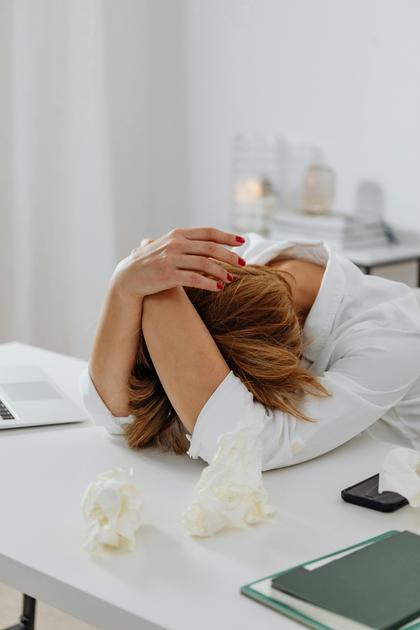As women over 30, we often juggle numerous responsibilities, leading to underlying challenges like stress and depression. It’s crucial to recognize the early warning signals these emotional struggles present. Understanding how feelings of fatigue, anxiety, and hormonal imbalances creep in can empower you to take action. Many women, just like you, experience silent battles every day, feeling as if their struggles are invisible. But you are not alone, and there are ways to address these challenges.
Many women have turned to simple, holistic approaches for relief. Discover how many are overcoming this without heavy medications.
The Calm Reset — 7 Days to Feel Steady, Kind & In Control Again - Only $2.99
Gentle guidance trusted by our community.
Understanding Stress and Its Impact
Stress is a common experience for women over 30, often stemming from various sources such as work, family responsibilities, and personal expectations. Understanding stress is crucial, as it can significantly impact mental and physical health. Chronic stress can lead to fatigue, anxiety, and even depression.
This intricate relationship between stress and health is especially important for women in this age group. Many women juggle multiple roles, including career advancement and family care, often leading to overwhelming feelings. Recognizing the impact of stress is the first step toward reclaiming control over one’s life.
Common Symptoms of Depression in Women
Women experiencing depression may present various symptoms that can often be overlooked. These can include:
- Persistent Sadness: A feeling of emptiness or hopelessness that seems to linger.
- Changes in Sleep Patterns: Difficulty falling or staying asleep, or sleeping too much.
- Fatigue: A constant feeling of tiredness that doesn’t go away with rest.
- Loss of Interest: Activities once enjoyed may no longer bring pleasure.
- Anxiety: Increased feelings of worry and nervousness.
Many women may dismiss these feelings as simply a part of aging, but it’s crucial to recognize them as potential signs of a deeper issue. Understanding these symptoms can serve as a wake-up call.
The Role of Hormonal Changes
Hormonal fluctuations are prevalent as women approach their 30s and 40s. Menstruation cycles, pregnancy, and menopause can significantly affect mood and mental health. The drop in estrogen, particularly during perimenopause, can lead to emotional instability, anxiety, and depressive episodes.
This connection between hormones and emotional health is vital for women to understand. Acknowledging these changes can help in seeking appropriate support and treatment, resulting in improved well-being.
Identifying Early Warning Signals
Recognizing early warning signals is essential for addressing stress and depression effectively. Some early signs to watch for include:
- Social Withdrawal: Avoiding friends or family and reducing social interactions.
- Irritability: Increased agitation or frustration with minor issues.
- Changes in Appetite: Significant weight loss or gain due to emotional eating or loss of appetite.
- Concentration Issues: Difficulty focusing on tasks at work or home.
Being mindful of these signals can empower women to take proactive steps toward better mental health.
Daily Habits That Contribute to Stress
Certain daily habits may unintentionally contribute to increased stress levels. These include:
- Poor Nutrition: A diet lacking in nutrients can negatively impact mood and energy.
- Insufficient Physical Activity: Exercise is known to reduce stress, yet busy schedules often lead to inactivity.
- Excessive Screen Time: Constant engagement with screens can increase anxiety and disconnect us from reality.
- Lack of Sleep: Sleep deprivation affects emotional regulation and resilience.
Addressing these habits can create a more balanced and fulfilling lifestyle, reducing stress and its impact on mental health.
Coping Mechanisms for Emotional Challenges
Finding effective coping mechanisms is crucial in tackling emotional challenges. Here are some strategies that can be beneficial:
- Mindfulness and Meditation: Practicing mindfulness can greatly reduce stress and improve emotional health.
- Journaling: Writing down thoughts and feelings can provide clarity and emotional relief.
- Seeking Support: Talking to trusted friends or family members can lighten emotional burdens.
- Engaging in Hobbies: Dedicating time to favorite activities can rejuvenate the spirit.
Discovering which techniques work best can lead to a more stable emotional state.
The Importance of Self-Care
Self-care should never be seen as a luxury but as a vital practice for maintaining well-being. Simple acts, such as:
- Taking Time for Yourself: Whether it’s a long bath, reading a book, or enjoying a quiet cup of tea, prioritizing “me time” is key.
- Setting Boundaries: Learning to say no protects personal time and reduces stress.
- Practicing Gratitude: Reflecting on positive experiences can shift focus away from stressors.
Incorporating self-care into daily routines fosters a positive relationship with oneself and aids in managing stress levels.
Building a Support System
A strong support system is invaluable for mental health. Cultivating relationships with friends, family, or support groups can provide:
- Emotional Support: Having someone to share feelings with can alleviate stress.
- Accountability: Encouraging friends can motivate healthier habits and choices.
- Shared Experiences: Connecting with others going through similar experiences can foster understanding and empathy.
Building and maintaining these connections is essential for navigating the challenges of life.
Seeking Professional Help
Sometimes, seeking help from a professional is necessary. A therapist or counselor can provide:
- Expert Guidance: Professional support can help uncover deeper issues.
- Safe Space: Therapy offers a non-judgmental environment for expressing fears and frustrations.
- Effective Strategies: Professionals can equip individuals with tools to manage stress and depression effectively.
It’s a strength to recognize when additional support is needed.
Finding Hope and Healing Together
It’s important to remember that you’re not alone. Many women over 30 face similar struggles, but there is hope. Small steps can lead to profound changes in mental health and well-being.
Take action today; many women are finding ways to manage stress and depression without heavy medications. See how many women are finding solutions together. It’s possible to navigate these challenges and emerge with newfound strength and peace.
With patience and determination, improvement is entirely achievable. Begin this journey to a balanced life and inspire others along the way.
The Calm Reset — 7 Days to Feel Steady, Kind & In Control Again - Only $2.99
Gentle guidance trusted by our community.







